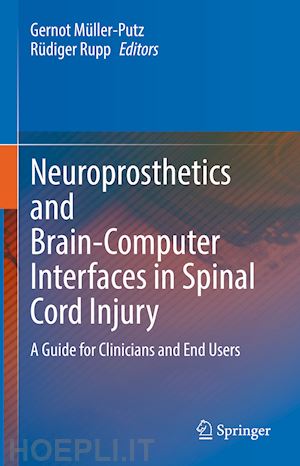
Questo prodotto usufruisce delle SPEDIZIONI GRATIS
selezionando l'opzione Corriere Veloce in fase di ordine.
Pagabile anche con Carta della cultura giovani e del merito, 18App Bonus Cultura e Carta del Docente
This book provides a comprehensive overview of the current state of the art of practical applications of neuroprosthesis based on functional electrical stimulation for restoration of motor functions lost by spinal cord injury and discusses the use of brain-computer interfaces for their control.
The book covers numerous topics starting with basics about spinal cord injury, electrical stimulation, electrical brain signals and brain-computer interfaces. It continues with an overview of neuroprosthetic solutions for different purposes and non-invasive and invasive brain-computer interface implementations and presents clinical use cases and practical applications of BCIs. Finally, the authors give an outlook on cutting edge research with a high potential for clinical translation in the near future.
All authors committed themselves to use easy-to-understand language and to avoid very specific information, focusing instead on the essential aspects. This makes this book an ideal choice not only for researchers and clinicians at all stages of their education interested in the topic of brain-computer interface-controlled neuroprostheses, but also for end users and their caregivers who want to inform themselves about the current technological possibilities to improve paralyzed motor functions.
Gernot R. Müller-Putz is head of the Institute of Neural Engineering and its associated Laboratory of Brain-Computer Interfaces at Graz University of Technology. He received his MSc in electrical and biomedical engineering in 2000, his PhD in electrical engineering in 2004 and his habilitation and “venia docendi” in medical informatics from Graz University of Technology in 2008. Since 2014 he is full professor for semantic data analysis.
He has gained extensive experience in the field of biosignal analysis, brain-computer interface research, EEG-based neuroprosthesis control, non-invasive motor decoding, communication with BCI in patients with disorders of consciousness, hybrid BCI systems, the human somatosensory system, and BCIs in assistive technology. He has also managed several national and international projects and has recently coordinated the EU Horizon 2020 project MoreGrasp. Furthermore, he organized and hosted seven international Brain-Computer Interface Conferences over the last 15 years in Graz, recently the 8th Conference in Sept. 2019. He was and is Program Committees Member of several international venues as the BCI Meeting of the BCI Society, the NeuroIS Restreat, and ICCHP. He is Associate Editor of Frontiers in Neuroscience, special section Neuroprosthetics, IEEE Transactions in Biomedical Engineering and the Brain-Computer Interface Journal. Since August 2019 he is Speciality Chief Editor of Frontiers in Human Neuroscience: Brain-Computer Interface. In May 2018 he was elected into the Board of Directors of the International Brain-Computer Interface Society. In November 2018 he founded the NeuroIS Society as a co-scientific director. He is further member of IEEE, IFESS, ÖGBMT, and IngeST.
He won several paper and poster awards; recently he was awarded with an ERC Consolidator grant “Feel your Reach” from the European Research Council. In May 2017 he received the Ludwig-Guttman Award from the German Medical Spinal Cord Injury Association (DMGP). In May 2019 he received the science prize of the State of Styria.
Rüdiger Rupp received the Dipl.-Ing. degree in electrical engineering with focus on biomedical engineering and his Dr.-Ing. degree from the Technical University of Karlsruhe, Germany, in 1994 and 2008, respectively. In 2018, he received his venia legendi in Experimental Neurology from Heidelberg University.
After working at the Institute for Biomedical Engineering and Biocybernetics (Prof. G. Vossius) until 1996, since 1997 he is with the Spinal Cord Injury Center (Head: Prof. N. Weidner) of Heidelberg University Hospital, Germany, where he holds the position as the head of the section Experimental Neurorehabilitation.
His main research interests are in the field of rehabilitation engineering for spinal cord injured patients. This includes neuroprosthetics mainly of the upper extremity, man-machine interfaces, gait analysis, development and clinical validation of novel methods and devices for locomotion therapy and realization of software projects for standardized documentation of rehabilitation outcome.
He is author of more than 220 journal, book and conference abstracts and holds two patents. He has been awarded several times for his work and is senior member of IEEE, founding member of IFESS, and member of the VDE, DMGP, DGOOC, NervClub, ISCoS and ASIA as chair of the International Standards committee. He is on the board of directors of the Medical Spinal Cord Injury Association of the German-speaking countries and German Spinal Cord Injury Foundation and on the editorial board of Spinal Cord and Medical Engineering and Physics.











Il sito utilizza cookie ed altri strumenti di tracciamento che raccolgono informazioni dal dispositivo dell’utente. Oltre ai cookie tecnici ed analitici aggregati, strettamente necessari per il funzionamento di questo sito web, previo consenso dell’utente possono essere installati cookie di profilazione e marketing e cookie dei social media. Cliccando su “Accetto tutti i cookie” saranno attivate tutte le categorie di cookie. Per accettare solo deterninate categorie di cookie, cliccare invece su “Impostazioni cookie”. Chiudendo il banner o continuando a navigare saranno installati solo cookie tecnici. Per maggiori dettagli, consultare la Cookie Policy.